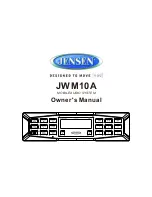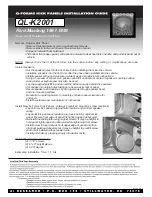27
CONNECT
Users Manual
IC
2
Before going on you should first verify that the correct
measurement system is being used (feet or meters).
The default measurement system is feet but you may
want to use meters.
To check or change the setting, right click in the center
of the beam steering window or select Preferences
from the Options pull down menu in the tool bar section
of RHAON window. If you want to change from feet to
meters, click in the Metric radio button.
Note that this window also allows you to control the
behavior of the Fault Relay and the Power-On sequenc-
ing delay.
The Beam Steering tab contains the setting controls
for the appearance of the Beam Steering window. The
normal default setting are shown.
This setup window also allows you to change the height
of the measuring plane (the Ear Height). Until you are
more familiar with the program we suggest you accept
the default setting. There are times, however, when you
will want to change the height of the measuring plane. It
is set to 1.2 meters (3.94 feet) which is fine for a seated
audience, but not for a standing audience. For a stand-
ing audience a height of 5.5 feet is commonly used.
Note that the measuring plane does not show in the
mapping screen. The heavy dark line is the floor level
and not the measuring plane.
The Mapping Appearance section allows you to control
the appearance of the main Mapping plot. For now, we
suggest using the default settings. You can experiment
with various settings later.
The Scale Level Views section gives you control over
the scales used in the main Mapping window. Notice
that you also have the option of disabling (turning off)
the warning messages that pop up in Beam Steering
and the Beam EQ Normalization feature.
Many experienced users like to use the Fixed Range
option under Scale Level Views; setting the Round Up
to 5 and the Show Range to 5. You may want to experi-
ment with this to see which settings you like best. We
used the Fixed Range option for the displays in this manual.
We’ll investigate the other tabs later.


















